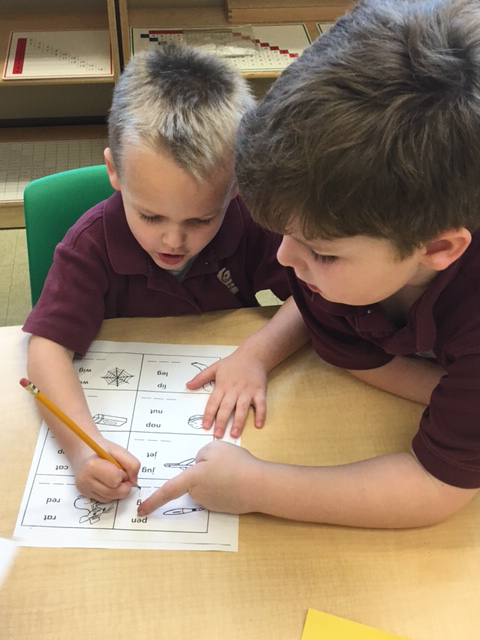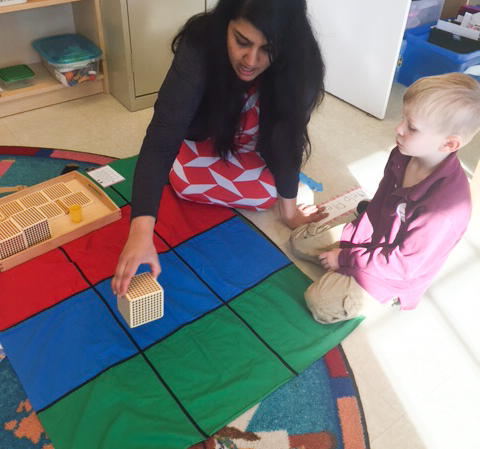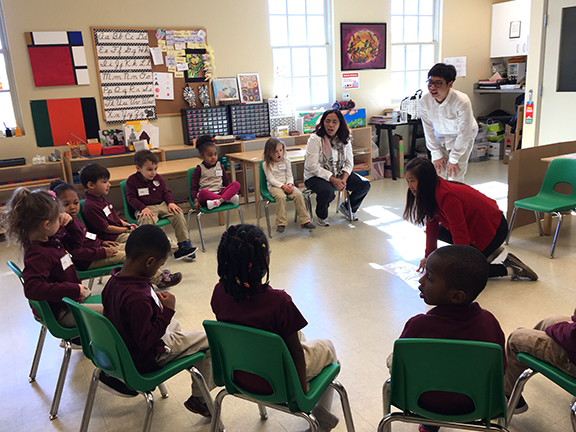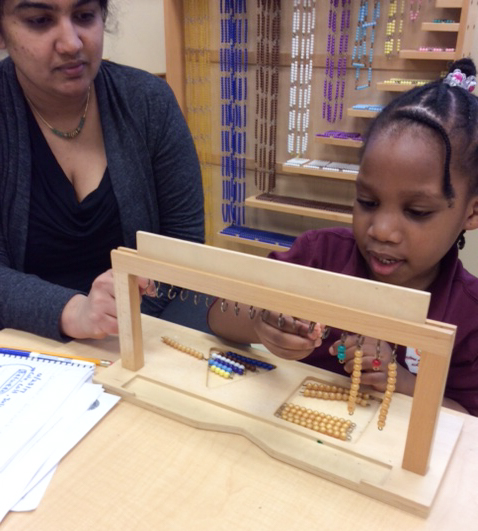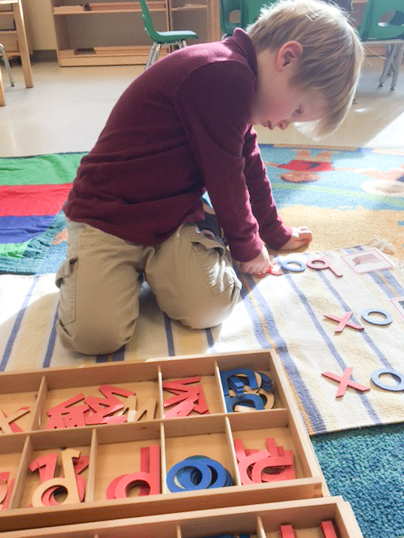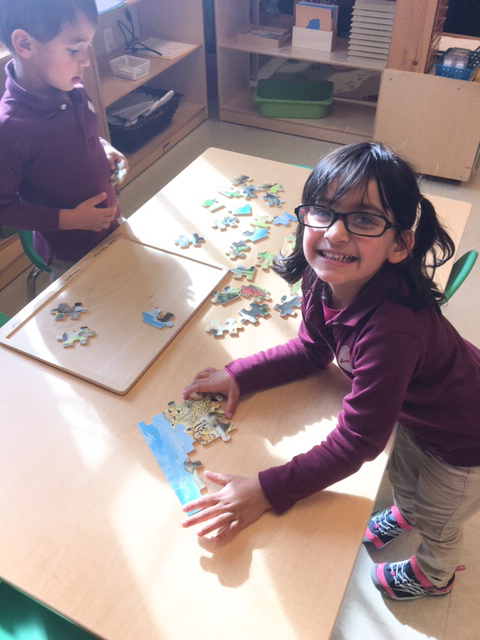The Primary curriculum integrates several focus areas into a fully comprehensive 3 year program. The Early Childhood curriculum of a Montessori school has four basic components, which include Practical Life, Sensory, Language, and Math. In addition to this, there are cultural extensions consisting of culture studies, geography, history, botany, zoology, arts, in addition to music and movement.
Practical life: A basic component of the Montessori curriculum is Practical Life. Children learn skills such as cleaning tables, putting objects back on a shelf where they belong, and, more importantly, how to care for themselves. They are taught how to make their own snacks when they get hungry, how to dress and clean themselves, and how to care for their environment. Many aspects of Practical Life also help with the development of eye-hand coordination. For example, children learn, through trial and error, how to pour liquid from one object into another without spilling.
Sensory: According to Dr. Montessori, “The sensory curriculum is designed to help the child focus his/her attention more carefully on the physical world, exploring with each of his/her senses the subtle variations in the properties of objects.” In other words, children learn to pay more attention to their world through their senses. The jobs that help children to accomplish this include the pink tower, the brown stair, the red rods, the cylinder blocks, knobless cylinders, sandpaper tablets, thermic (temperature) tablets and jars, baric (weight) tablets, smelling bottles, and sound boxes, to name just a few. All these jobs start simply and move towards more complex understanding in a way that encourages the child and enhances his/her natural creativity and curiosity.
Mathematics: Mathematical abstraction is mastered by manipulating the concrete. The learning process moves from simple to complex and concrete to abstract. Materials relate to pattern recognition, sorting, sequencing, and matching. The concepts build on one another to inspire confidence.
Language: From a solid basis in spoken language, reading and writing are developed using a variety of tactile materials and lessons. While many children do not begin to learn the fundamentals of reading until they enter grade school, Montessori children begin to learn as soon as they show an interest – no matter what the age. The Montessori environment is saturated with opportunities for children to enhance this interest. Sandpaper letters, the movable alphabet, metal insets, verbal command cards, command cards, and exceptional children’s literature all have most Montessori children reading very well by the time they enter first grade. A love of reading is a major component of the Montessori educational system, and children are not only encouraged to do so, even if they don’t know the words, but are surrounded by students and teachers alike who thoroughly enjoy a good book. Inclusive in their reading education is their writing education, for it is much easier for one to learn how to read if one is also encouraged to write or draw their thoughts, ideas, and feelings at the same time.
Cultural Studies: the world’s geography and peoples are explored through such materials as maps, flags, water and land forms, and books. Children may choose a continent folder with pictures of people, places, food, clothing, children, work, housing, transportation, plants and animals. Conversations explode into questions and wonderment about the world with its similarities and differences. Children share family experiences, where grandma lives, where we have traveled or what is in the news.
Integrated Art and Music: visual and expressive arts are incorporated into daily classroom activities. Artists and musicians are represented through reproductions and recordings of their works.
BMS also has further focus on the environment and outside time to explore gardening and engage in physical activity with classmates. Montessori teaching believes that physical activity is a complement to mental cognition. Foreign language is introduced at the Primary level. Full-day students receive additional curriculum support from specialists in the areas of physical education, foreign language and art, in addition to enjoying field trips.
BMS Kindergarten: When 3-year olds and some 4-year olds nap in the afternoon, the 5-6 year-olds gather for the BMS Kindergarten. The BMS Kindergarten class hums with motivated, focused activity. It is in the Kindergarten year that your child will be “at the top of the class” in terms of seniority. The responsibility and pride children feel in this role gives a great sense of accomplishment. The multi-age experience offers many opportunities for five year-olds to help the younger children and to be competent role models. In addition to reinforcing their academic knowledge, this experience enhances their self-esteem and develops their self-confidence – two qualities which enable them to try new challenges as they move past BMS to a 1st Grade/Elementary Program.
Kindergarten is a time when skills that have been developing over previous years start to solidify. The Kindergarten year is a culmination. The children are unfolding as leaders, beginning readers and budding mathematicians. They are proud of their accomplishments and eagerly await the more complex lessons their teachers present. Kindergarten is particularly important: an explosion into new and challenging work takes place.
The focus of the more complex Kindergarten curriculum and projects revolve around language, math, biology, botany, geography, physical sciences and history.
Children mature at very different rates and their periods of readiness vary a great deal. The five year old can gain an early understanding of many difficult concepts which are the usual stumbling blocks in grade school. Long before he is faced with abstract terms (unit, fraction, etc), he explores them in simple concrete materials. For example, he can build a peninsula, put pictures on a timeline, act out verbs, “carry one” in addition, change ten units into one ten, add fractional quarters to make one-half, etc. The use of individual concrete materials accommodates many levels of ability.







